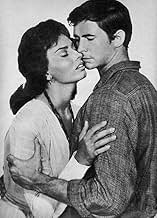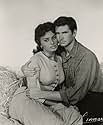IMDb-BEWERTUNG
6,5/10
1513
IHRE BEWERTUNG
Füge eine Handlung in deiner Sprache hinzuDesperation and secret passions on a family farm lead to tragedy.Desperation and secret passions on a family farm lead to tragedy.Desperation and secret passions on a family farm lead to tragedy.
- Für 1 Oscar nominiert
- 3 Nominierungen insgesamt
Rebecca Welles
- Lucinda Cabot
- (as Rebecca Wells)
Edna Bennett
- Housewife Gossip
- (Nicht genannt)
Florine Carlan
- Young Girl
- (Nicht genannt)
Robert Cass
- Seth
- (Nicht genannt)
- …
Vera Denham
- Farm Woman
- (Nicht genannt)
Harvey B. Dunn
- Farmer
- (Nicht genannt)
Dick Elliott
- Old Farmer
- (Nicht genannt)
Jamie Forster
- Farmer
- (Nicht genannt)
Greta Granstedt
- Men
- (Nicht genannt)
Sandra Harrison
- Young Girl
- (Nicht genannt)
Empfohlene Bewertungen
This movie was made primarily as a star vehicle and things like the artistic integrity of the plot were thought of as unimportant. Needless to say, the movie suffered noticeably.
I saw this movie originally as part of a course on plays made into movies. Though this wasn't the most badly manhandled of the plays that we studied, it is a close second to "Sexual Perversity in Chicago" which became "About Last Night" staring Rob Lowe and Demi Moore.
Don't get me wrong, it's not a bad movie, but it could have been great.
As much as I hate to say it, this is one of the rare cases where a remake might be in order. It is possible to imagine that a director willing to make a more faithful rendition could easily create something better than the original.
I saw this movie originally as part of a course on plays made into movies. Though this wasn't the most badly manhandled of the plays that we studied, it is a close second to "Sexual Perversity in Chicago" which became "About Last Night" staring Rob Lowe and Demi Moore.
Don't get me wrong, it's not a bad movie, but it could have been great.
As much as I hate to say it, this is one of the rare cases where a remake might be in order. It is possible to imagine that a director willing to make a more faithful rendition could easily create something better than the original.
When "Desire Under the Elms" came out at the end of the 1950s, it was dismissed by critics who were more interested in parading their education and artistic credentials than in assessing the movie sensibly. In particular, they commented on how far the film fell short of the original stage play. Nearly fifty years later, a more balanced perspective is possible.
Regardless of how it compares with the theatrical original, "Desire Under The Elms" works successfully as a dramatic movie. There is real tension as the drama unfolds, and the audience feels a sense of horror when it realises what Anna (Sophia Loren) is going to do to prove her love. The resolution is genuinely tragic, and this is reinforced by the fact that the two lovers were unlikable people until love entered their lives and gave them humanity and consideration for others.
The acting is quite good all round, and presumably much of the credit goes to the director Delbert Mann. (Some of his other films during this period were also well-acted: "The Dark At The Top Of The Stairs"/"The Bachelor Party"). Sophia Loren is a real surprise. I have never worshipped at her throne, but she is excellent in this movie, playing a greedy, calculating woman who marries a much older man merely to have a comfortable home. At the beginning, her venality and disregard for other people make her highly unpleasant, and she is not particularly attractive physically either. As love gradually dominates her, she becomes physically very attractive - her fans, no doubt, will say she becomes beautiful - until the circumstances she has helped create imprison her. Then once again, her physical allure subsides and she becomes gaunt and drawn. Obviously this play with Sophia Loren's looks was a joint effort, and presumably the camera department, costume department and make-up department all deserve credit.
Daniel L. Fapp's Vista-Vision cinematography is crystal clear and a major asset. The film's only big failing is the blatant artificiality of the back drops. "Desire Under The Elms" was obviously made in a studio.
Regardless of how it compares with the theatrical original, "Desire Under The Elms" works successfully as a dramatic movie. There is real tension as the drama unfolds, and the audience feels a sense of horror when it realises what Anna (Sophia Loren) is going to do to prove her love. The resolution is genuinely tragic, and this is reinforced by the fact that the two lovers were unlikable people until love entered their lives and gave them humanity and consideration for others.
The acting is quite good all round, and presumably much of the credit goes to the director Delbert Mann. (Some of his other films during this period were also well-acted: "The Dark At The Top Of The Stairs"/"The Bachelor Party"). Sophia Loren is a real surprise. I have never worshipped at her throne, but she is excellent in this movie, playing a greedy, calculating woman who marries a much older man merely to have a comfortable home. At the beginning, her venality and disregard for other people make her highly unpleasant, and she is not particularly attractive physically either. As love gradually dominates her, she becomes physically very attractive - her fans, no doubt, will say she becomes beautiful - until the circumstances she has helped create imprison her. Then once again, her physical allure subsides and she becomes gaunt and drawn. Obviously this play with Sophia Loren's looks was a joint effort, and presumably the camera department, costume department and make-up department all deserve credit.
Daniel L. Fapp's Vista-Vision cinematography is crystal clear and a major asset. The film's only big failing is the blatant artificiality of the back drops. "Desire Under The Elms" was obviously made in a studio.
Desire Under the Elms is one of those films that is a lethal combination: sordid and sluggish. It's not as though it would have been much better or less offensive if it went at a faster clip, but the funereal pacing only makes you recognize how hopeless it all is. The three leads try (and Burl Ives in particular gets well into the part), but at this point, the tale of a forbidden love affair and its consequences, once a much praised play by Eugene O'Neill, feels more like one of those horribly overheated and vulgar true crime stories that feature on TV as you race to move on to another channel. What can you really say when you can't stand any of the parties in this love (or is it lust) triangle? As Audrey Hepburn might have said in Breakfast at Tiffany's, they are all "superrats". What little there is that is salvageable to some degree is the remarkably crisp black-and-white cinematography and yet another fine musical score by Elmer Bernstein. Otherwise, a complete wash.
After a couple of studio films shot on location, Italian actress and sex symbol Sophia Loren finally made it onto Hollywood soil for this uneven, uncertain melodrama adapted from Eugene O'Neill's controversial play. A tyrannical New England farmer (Burl Ives), who apparently worked his past two wives to death, brings home a new wife to meet his sons--two of whom take off for California and the third (Anthony Perkins) who stays and eventually falls in love with the Mrs. The performers seem to be at a mismatch with this very strange material; though they try hard, the heavy prose and illogical situations would be enough to defeat anybody. The character motivations aren't always clear, not helped by the narrative which, at a crucial point, jumps ahead in time and nearly alienates the audience. Ives gives a full-throttle, blustery-old-windbag performance which infuses the scenario with a prickly tension (and the screenplay surprisingly never scores points against him), but glinty-eyed Loren is a bit out of her depth. Still, she survives the absurd final reel with her dignity intact, while the picture ends on such a dour note that the overall impression is one of supreme dissatisfaction. Daniel L. Fapp won an Oscar nomination for his handsome (if overlit) photography; Delbert Mann directed in an awkward and stagy fashion. **1/2 from ****
Ephraim Cabot is an old man of amazing vitality who loves his New England farm with a greedy passion. Hating him, and sharing his greed, are the sons of two wives Cabot has overworked into early graves. Most bitter is Eben, whose mother had owned most of the farm, and who feels who should be sole heir.
This is a great cast all around, with Burl Ives and Sophia Loren. But Anthony Perkins is the star of the show and really excels as a conflicted son and love interest. Over the years, he has become increasingly synonymous with Norman Bates, but films like this show he is more versatile than his later horror career suggests.
I wonder how audiences viewed the morals of this film in the 1950s. While not quite incestuous, there is a very questionable morality. If not from the son, at the very least from a wife who is romantically linked to two generations of the same family.
This is a great cast all around, with Burl Ives and Sophia Loren. But Anthony Perkins is the star of the show and really excels as a conflicted son and love interest. Over the years, he has become increasingly synonymous with Norman Bates, but films like this show he is more versatile than his later horror career suggests.
I wonder how audiences viewed the morals of this film in the 1950s. While not quite incestuous, there is a very questionable morality. If not from the son, at the very least from a wife who is romantically linked to two generations of the same family.
Wusstest du schon
- WissenswertesThe original 1924 Broadway production made Walter Huston a Broadway star; he was 40 years old, playing a septuagenarian. He was later in several more Eugene O'Neill plays.
- PatzerIn several outdoor scenes, people cast two (or more) shadows showing that there are two light sources.
- VerbindungenFeatured in Biography: Sophia Loren: Actress Italian Style (1997)
Top-Auswahl
Melde dich zum Bewerten an und greife auf die Watchlist für personalisierte Empfehlungen zu.
- How long is Desire Under the Elms?Powered by Alexa
Details
- Erscheinungsdatum
- Herkunftsland
- Sprache
- Auch bekannt als
- Desire Under the Elms
- Drehorte
- Produktionsfirma
- Weitere beteiligte Unternehmen bei IMDbPro anzeigen
- Laufzeit1 Stunde 51 Minuten
- Farbe
- Seitenverhältnis
- 1.85 : 1
Zu dieser Seite beitragen
Bearbeitung vorschlagen oder fehlenden Inhalt hinzufügen

Oberste Lücke
By what name was Begierde unter Ulmen (1958) officially released in Canada in English?
Antwort































